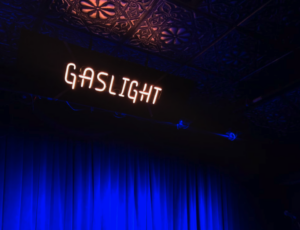“You’re just sensitive”
“You are upset over nothing”
“I never said that”
“You must be confused again”
“You sound crazy”
Some examples of gaslighting:
- Dismissing your feelings and perceptions as invalid or even pathological. (“You sound crazy”)
- Attempting to convince you that you should not trust your memory (“That’s not what happened.” “You know you struggle to remember tings currently.”)
- Pretending not to understand what you’re saying so that they don’t have to respond (“I don’t know what you’re talking about”)
- Trying to change the subject to divert you from the topic (“Have you been talking to your friend again? I don’t think they are healthy for you and only confuse you more.”)
- Flatly denying that they have said or done something they did. This happens often, it’s not a one-time thing (“I never said that. You heard that wrong. I would never do such a thing”).
 How can you tell the difference between gaslighting and disagreement?
How can you tell the difference between gaslighting and disagreement?
Not everyone’s perception of an event is the same. We will sometimes disagree or have different views on what happened. We may even have strong opinions and reject another person’s point of view. Still, it doesn’t have to mean it’s gaslighting. The main difference between gaslighting and disagreement is about power. In disagreement, the focus is on challenged viewpoints or hurt feelings. In gaslighting, the main goal is to take control over the other person by undermining their sense of self and making them question their sanity.
Someone who uses gaslighting may try to convince the other person that they remember things wrong, that they are overreacting and that; therefore, their view of the situation and their feelings are not valid. On the receiving end of this behavior, the person can feel disoriented, confused, and worn out. They start asking themselves if they may be imagining things or if they are even justified to think or feel the way they do. Gaslighting is usually not a one-time thing. Rather, it is used over time to belittle the other person into being controlled.
The focus of disagreement is explaining one’s point of view. One may even try to convince the other person to change their point of view, but NOT try to convince them that they can’t trust themselves. Disagreements often involve unpleasant emotions. They can involve tension, stress, and heated discussion. However, if there is a pattern of disagreement exactly in situations when one side feels hurt and tries to let the other person know about it, then there is a high possibility there is gaslighting involved.
 Are gaslighters aware of what they do?
Are gaslighters aware of what they do?
Those who use gaslighting are everyday people as well. They usually use this form of manipulation to ease their anxiety surrounding the possibility of losing control and power in the relationship or to protect themselves from feeling ashamed. Gaslighting serves as a tool to deflect responsibility because in their world, taking responsibility for hurtful actions = shame and degradation. So, instead, they turn to tearing down the other person, all the while keeping them hooked. For them, gaslighting is a cognitive strategy for self-regulation and co-regulation.
 Often, people who use gaslighting are aware of their tactic. They know it’s effective, and they consciously use it to manipulate the other person to gain power. However, there are people who may not even know that what they are doing is manipulative and so damaging. Either way, if you recognize that you are experiencing gaslighting, it’s crucial to remember that you are not to blame for what you are experiencing. Whatever the reason behind the gaslighting, the other person is consciously choosing to behave this way, and there is nothing you are doing that causes this behavior. It is something they choose to do to protect their self-esteem and their sense of control. There are many ways to protect these things, and they are choosing the one that is harming you.
Often, people who use gaslighting are aware of their tactic. They know it’s effective, and they consciously use it to manipulate the other person to gain power. However, there are people who may not even know that what they are doing is manipulative and so damaging. Either way, if you recognize that you are experiencing gaslighting, it’s crucial to remember that you are not to blame for what you are experiencing. Whatever the reason behind the gaslighting, the other person is consciously choosing to behave this way, and there is nothing you are doing that causes this behavior. It is something they choose to do to protect their self-esteem and their sense of control. There are many ways to protect these things, and they are choosing the one that is harming you.
The most important first step toward protecting yourself from gaslighting is recognizing that it’s happening. From there, you can start making rational steps regarding what to do next. This may be working on your well-being, addressing the problem and setting boundaries, or stepping away from the relationship. Talking to a mental health professional may also be beneficial; whether it’s in the form of individual therapy or couples counseling. Recovery may take some time, but it is possible to learn skills to overcome the damage gaslighting may have caused you.
Blog adapted from Ashley Kreze, MA, RP, RCC
Resources:
Abramson, K. (2014). Turning up the lights to gaslighting. Philosophical Perspectives, 28, 1–30. https://www.jstor.org/stable/26614542
Catapang Podosky, P. (2021). Gaslighting, First- and Second-Order. Hypatia, 36(1), 207-227.
Merriam-Webster. (n.d.). Gaslighting. In Merriam-Webster.com dictionary. Retrieved December 18, 2022, from https://www.merriam-webster.com/dictionary/gaslighting
Miano, P., Bellomare, M., & Genova, V. G. (2021). Personality correlates of gaslighting behaviours in young adults. Journal of Sexual Aggression, 27(3), 285-298.


